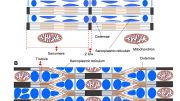
A new study suggests that higher levels of lean muscle might reduce the risk of Alzheimer’s disease. While lean muscle’s protective effect against Alzheimer’s was evident, further research is required to understand the underlying mechanisms and its broader health implications.
Additional research is required to elucidate the potential biological pathways, according to the authors of the study.
High levels of lean muscle could protect against Alzheimer’s disease, according to a comprehensive study featured in the open-access journal BMJ Medicine. However, the study authors emphasize the need for additional research to understand the underlying biological mechanisms and assess the clinical and public health outcomes.
Multiple studies have linked obesity to an elevated risk of Alzheimer’s disease. This connection could be due to the accompanying rise in inflammation, insulin resistance, and increased levels of the brain-detrimental protein, amyloid β, present in fat tissues.
Obesity has been associated with a heightened risk of Alzheimer’s disease in numerous studies, possibly explained by the attendant increased inflammation, insulin resistance, and higher levels in fat tissue of the protein harmful to brain health, amyloid β.
Lower levels of lean muscle have also been associated with a heightened risk of the disease, but it’s not clear if this might precede or succeed a diagnosis.
To try and find out, the researchers used Mendelian randomization, a technique that uses genetic variants as proxies for a particular risk factor—in this case, lean muscle—to obtain genetic evidence in support of a particular outcome—in this study, Alzheimer’s disease risk.
They drew on 450, 243 UK Biobank participants; an independent sample of 21,982 people with, and 41,944 people without, Alzheimer’s disease; a further sample of 7329 people with, and 252,879 people without, Alzheimer’s disease to validate the findings; and 269,867 people taking part in a genes and intelligence study.
Bioimpedance—an electric current that flows at different rates through the body depending on its composition—was used to estimate lean muscle and fat tissue in the arms and legs, the results of which were adjusted for age, sex, and genetic ancestry.
Some 584 genetic variants were associated with lean muscle mass; none was located in the APOE gene region that is associated with vulnerability to Alzheimer’s disease. These genetic variants combined explained 10% of the difference in lean muscle mass in the arms and legs of the study participants.
On average, higher (genetically proxied) lean muscle mass was associated with a modest, but statistically robust, reduction in Alzheimer’s disease risk.
This finding was replicated in the further sample of 7329 people with, and 252,879 people without, Alzheimer’s disease, using different measures of lean muscle mass—trunk and whole body.
Lean mass was also associated with better performance on cognitive tasks, but this association didn’t explain the protective effect of lean mass on Alzheimer’s disease risk.
Nor was body fat, adjusted for lean mass, associated with the risk of Alzheimer’s disease, but it was associated with poorer cognitive task performance.
“These analyses provide new evidence supporting a cause-and-effect relation between lean mass and risk of Alzheimer’s disease,” say the researchers.
The findings also “refute a large effect of fat mass on the risk of Alzheimer’s disease and highlight the importance of distinguishing between lean mass and fat mass when investigating the effect of adiposity measures on health outcomes,” they add.
But they caution: “Our findings need to be replicated with independent lines of complementary evidence before informing public health or clinical practice. Also, more work is needed to determine the cut-off values for age and degree of pathology of Alzheimer’s disease after which modifications of lean mass might no longer reduce the risk.”
Nor is it clear whether increasing lean mass could reverse the pathology of Alzheimer’s disease in patients with preclinical disease or mild cognitive impairment, they add.
However, they conclude that if future studies back their findings, “public health efforts to shift the population distribution of lean mass, potentially through campaigns to promote exercise and physical activity, might reduce the population burden of Alzheimer’s disease.”
Reference: “Genetically proxied lean mass and risk of Alzheimer’s disease: mendelian randomisation study” by Iyas Daghlas1, Malik Nassan and Dipender Gill, 29 June 2023, BMJ Medicine.
DOI: 10.1136/bmjmed-2022-000354









Be the first to comment on "New Research: High Levels of Lean Muscle Might Protect Against Alzheimer’s Disease"